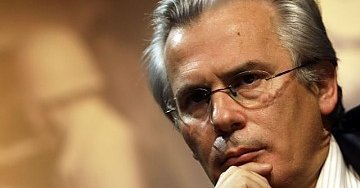The Spanish judge, Baltasar Garzón, being who he is however, has won worldwide recognition for pushing the limits of international law, notorious for its softness and relative inefficiency, and for his relentless pursuit of high profile figures both in Spain and abroad.
He has indicted Osama bin Laden, issued an arrest warrant for Augusto Pinochet, wanted to investigate U.S. Secretary of State Henry Kissinger and launched an inquiry into the suspected torture of detainees at the U.S. prison in Guantanamo. He is the scourge of dictators, ETA and drug mafias.
Today, in an ironic twist of fate, judge Garzón is the one standing on trial. The reason: he dared to look into Spain’s murky past.
Today, in an ironic twist of fate, judge Garzón is the one standing on trial. The reason: he dared to look into Spain’s murky past
In October 2008, judge Garzón issued a ruling which stated that his court was competent to investigate the ‘forced’ disappearances of more than 100,000 people during the Spanish Civil War (1936 – 1939) and the subsequent Franco dictatorship. He authorised the exhuming of dozens of mass graves, which supposedly lay the remains of those who disappeared. By officially declaring that Franco and his collaborators had been responsible for “mass killings, torture and the systematic, general and illegal detentions of political opponents”, Garzón has broken the nation’s most enduring taboo – to openly speak about the past, for the first time in more than 30 years.
On May 27th 2009, the Spanish Supreme Court allowed a criminal claim to be filed against the magistrate by two ultra right-wing organisations, the civil servants’ union Manos Limpias (Clean Hands) and the Association ‘Identidad y Libertad’ (Freedom and identity). Judge Garzón was accused of violating the 1977 Amnesty Law under which crimes committed during the Franco regime were granted a general pardon. The law was based on an unwritten ‘pact of forgetting’ which was considered crucial for the national reconciliation and the peaceful transition to democracy. Judge Garzón however, argued that amnesties were themselves illegal as “any amnesty law which aims at erasing crimes against humanity that cannot be described as political crimes, is null”.
The case was made even more absurd by allowing the old Fascist party – the same party who participated in the repression under investigation - to join the prosecution. As a result these organisations gained access to the personal details of the victims’ relatives.
Professor Vicenç Navarro, a former political exile, described this situation as “equivalent to the Supreme Court of Germany (presided over by a judge who swore loyalty to the Nazi Government) responding to the request of the Nazi Party and passing judgment on the only judge who had dared to try the crimes committed by the Nazi regime.[1]”
Is the Spanish judiciary politicised?
The final blow against judge Garzón came on April 7th 2010 when the Spanish Supreme Court Judge Luciano Varela brought formal charges against Garzón for knowingly exceeding his jurisdiction. If found guilty, Garzón may be prevented from performing his judicial functions for 10 to 20 years. Given that he is already 54, this would mean the end of his career.
While strictly speaking Garzón has violated the rules - under Spanish law, it is a very serious offense for a judge to wrongfully claim jurisdiction over a case [2]. The motives behind the actions of the Spanish judiciary have less to do with justice and more with political bias and personal animosity.
The motives behind the actions of the Spanish judiciary have less to do with justice and more with political bias and personal animosity.
The transition to democracy in 1978 was entirely controlled by the right-wing forces who have continued to dominate the army, the church and the judicial system. It therefore comes as no surprise that one of the two Supreme Court judges behind Garzón’s prosecution, Adolfo Prego, is notorious for his ultraconservative sympathies and writes for a pro-Franco magazine. The other, Luciano Varela, has long been at enmity with the famous magistrate.
On the face of it, the prosecution of Baltasar Garzón is all about the strict application of the rules, a reaffirmation of the maxim that no one is above the law. In effect, it is a politically driven case, part of Spain’s Memory War.
Should judge Garzón be suspended?
Garzón’s activities usually strike a chord with the public opinion. He has the backing of the common people as well as of the main human rights and jurists’ associations around the world. Even the international media, who, until recently, has been suspiciously quiet on the issue, raised a voice in his defence.
It is important to note here that the fate of Mr. Garzón is not just a Spainish internal matter. His personality outgrew the national boundaries long ago. To many around the world he personifies the quest against impunity. He is among the very few people today who would rather risk their life than leave brutal dictators and corrupt politicians intact. If judge Garzón be suspended this would be a heavy blow on Spain’s reputation and a dangerous setback for international law.
As for Spain – it seems that the earlier a post-totalitarian country deals with its past, the better. For more than 30 years the truth was forced to remain in the shadow by a self-imposed collective amnesia. Now the time has come for Spanish people to reconcile with its fascist past.
He is among the very few people today who would rather risk their life than leave brutal dictators and corrupt politicians intact


Follow the comments: |
|
